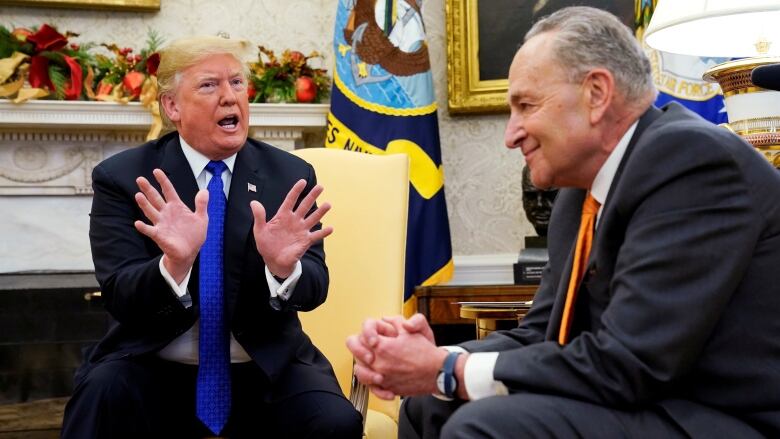Trump's clash with Democratic leaders may be a glimpse into the next 2 years
With Democrats set to control the House, televised spat was tense

The president of the United States. Rebuked in his own house by Democratic leaders. With the cameras rolling at his own invitation.
If Donald Trump wasn't feeling the effects of a new, post-midterms power realignment in Washington before, he likely was on Tuesday afternoon during a remarkable standoff in the Oval Office with Democratic House leader Nancy Pelosi and Senate minority leader Chuck Schumer.
Trump wants $5 billion to fund his border wall with Mexico; Democrats will only agree to $1.3 billion for "border security," not a wall. If the two sides can't reach an agreement by Dec. 21, funding for some government agencies expires, triggering a shutdown. Pelosi branded the scenario in personal terms.
"You should not have a Trump shutdown," she said.
"A what?" Trump asked. "Did you say 'Trump'—?"
"Trump shutdown. You have the White House, you have the Senate, you have the House of Representatives, you have the votes, you should pass it right now," Pelosi said, urging him to support spending legislation to avert the shutdown.
Trump fired back. There was little point in passing a government funding bill, he argued, if it would fall in the Senate. More crosstalk followed as Schumer also piled on. Voices were raised.
Pelosi and Schumer suggested repeatedly that they take the debate away from the gaggle of press — an idea Trump dismissed, saying he liked the "transparency." In the middle of the tense 17-minute exchange, Pelosi came to a regrettable conclusion: "This has spiralled downward."
Maybe. But the president ought to get used to this as he braces for a new Congress in January, when Democrats take control of the lower chamber from Republicans. The House is now the ultimate check and balance.
'Used them as props'
It's a new reality, said Brent Budowsky, a columnist for the U.S. politics website The Hill who formerly worked for Democratic leaders in Congress.
"It's opening day of a baseball season where there are totally new teams out there," Budowsky said. "Today was like the first inning."
Democrats ended the "one-party state," he said, and Trump will have to come to grips with the fact he "won't pass one piece of legislation — one spending bill, nothing — that the Democratic House doesn't agree with."
There's little that's remarkable about the president and influential lawmakers staking out new power relationships or making entry bids in advance of negotiations. What's unusual is that it unfolded publicly, offering a crystal-ball glimpse of the two years ahead for a divided government.

"But this doesn't have to do with divided government," said Mark Harkins, a senior fellow at the Government Affairs Institute at Georgetown University. "This has to do with the fact that president Trump brought in two Democrat leaders and used them as props.
"This is what negotiation looks like when you have a reality-TV star as your president."
Perfect sound bite
Only, Pelosi and Schumer weren't so willing to sit passively.
As much as Trump may be a master of media, Schumer and Pelosi aren't neophytes, having a combined half-century of experience in the U.S. Congress.
As they sparred, Trump said he could get a House majority to pass a spending bill.
"Then do it," Pelosi challenged.
Then Schumer repeatedly brought up wanting to avoid a shutdown — and the president handed Democrats a perfect sound bite for who to blame if it happened, declaring: "I am proud to shut down the government for border security."
Schumer grinned. (Vice-President Mike Pence, seated beside Trump, never spoke a word.)
"That's where the president started to lose some of the rhetorical battle," Harkins said. "I don't know if he was baited — if that's the right terminology — but I think he was willing to say 'Yeah, this is good politics: If you don't give me border security, I'd be behind shutting down the government.'"
The problem is that owning a shutdown, advocating for one or being seen as the cause of one is generally regarded as unwise. A majority of Americans would prefer to keep the government running and compromise on a border wall.
"You live by the camera, you die by the camera," said Ross Baker, a political science professor at Rutgers University. "And I think that anybody who says that he came out of there in a commanding position really misinterpreted the event."
Will Trump 'learn his lesson'?
Rachel Bovard, policy director at the Washington-based Conservative Partnership Institute, which advocates for conservative causes, saw Trump's decision to make the clash public as a presidential power move — Trump establishing the negotiating tactics Democratic leaders can expect for the next two years.
Bovard believes pundits might be underestimating just how symbolically important the border wall is to his base, which comprises an estimated 32 per cent of Americans.

Tax reform wasn't "wildly popular" with core supporters, she said. But getting $5 billion approved for the funding of a wall is "representative of the only accomplishment" Trump devotees can take away from the last two years of a unified Republican government, she said, seeing as the Trump administration has so far failed to fulfil promises to repeal the Affordable Care Act, defund Planned Parenthood or achieve substantive immigration reform.
As for what possessed the president to allow the awkward debate to be televised live, Harkins, with Georgetown University, is still scratching his head.
"He decided to let the other side play. They were in his house, under his rules. He did not have to do that," he said. "What will be fascinating is to watch the next one."
The next one?
That's the thing, Harkins said.
"Do we think he'll learn his lesson from this, or not?"



